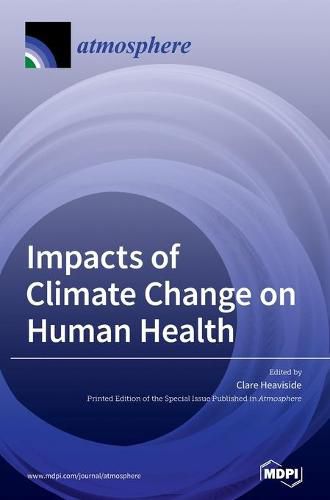Readings Newsletter
Become a Readings Member to make your shopping experience even easier.
Sign in or sign up for free!
You’re not far away from qualifying for FREE standard shipping within Australia
You’ve qualified for FREE standard shipping within Australia
The cart is loading…






This title is printed to order. This book may have been self-published. If so, we cannot guarantee the quality of the content. In the main most books will have gone through the editing process however some may not. We therefore suggest that you be aware of this before ordering this book. If in doubt check either the author or publisher’s details as we are unable to accept any returns unless they are faulty. Please contact us if you have any questions.
Climate change poses a serious challenge to our health and wellbeing. The increasing frequency of extreme weather events such as floods, droughts, and heatwaves, and the direct impacts of changes in temperature have direct impacts on health. At the same time, broader environmental change affects infectious disease risk, air pollution, and other forms of exposure. The different ways in which climate change will affect health are complex, interactive, and different communities are disproportionately affected. International actions such as the Paris Agreement and the Sustainable Development Goals recognise the future risks to society and acknowledge that we are already committed to a certain level of climate change. Future adaptation measures therefore need careful assessment and implementation for us to be able to minimise the potential risks from climate change and, at the same time, maximise the potential health benefits of a cleaner, greener world. This Special Issue comprises original research articles and detailed reviews on the likely impacts of climate change on health in a range of geographical settings, and the potential for adaptation measures to reduce some of these risks. Ultimately, studies like these will motivate policy level action for mitigation and help in determining the most effective methods of adaptation to reduce negative impacts in future through embedding scientific evidence into practice.
$9.00 standard shipping within Australia
FREE standard shipping within Australia for orders over $100.00
Express & International shipping calculated at checkout
This title is printed to order. This book may have been self-published. If so, we cannot guarantee the quality of the content. In the main most books will have gone through the editing process however some may not. We therefore suggest that you be aware of this before ordering this book. If in doubt check either the author or publisher’s details as we are unable to accept any returns unless they are faulty. Please contact us if you have any questions.
Climate change poses a serious challenge to our health and wellbeing. The increasing frequency of extreme weather events such as floods, droughts, and heatwaves, and the direct impacts of changes in temperature have direct impacts on health. At the same time, broader environmental change affects infectious disease risk, air pollution, and other forms of exposure. The different ways in which climate change will affect health are complex, interactive, and different communities are disproportionately affected. International actions such as the Paris Agreement and the Sustainable Development Goals recognise the future risks to society and acknowledge that we are already committed to a certain level of climate change. Future adaptation measures therefore need careful assessment and implementation for us to be able to minimise the potential risks from climate change and, at the same time, maximise the potential health benefits of a cleaner, greener world. This Special Issue comprises original research articles and detailed reviews on the likely impacts of climate change on health in a range of geographical settings, and the potential for adaptation measures to reduce some of these risks. Ultimately, studies like these will motivate policy level action for mitigation and help in determining the most effective methods of adaptation to reduce negative impacts in future through embedding scientific evidence into practice.